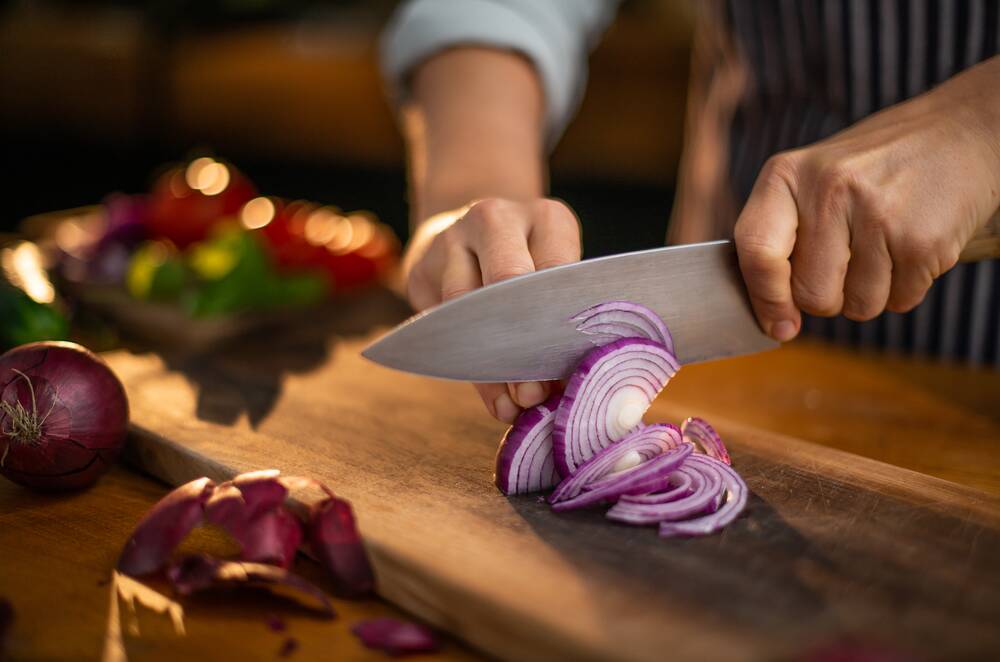Have you ever found yourself wondering what kind of metal a chef knife is forged from? You're certainly not alone. Both professional chefs and home cooking enthusiasts understand that the effectiveness of a chef knife largely hinges on the metal used in its construction. The choice of metal profoundly affects the knife's durability, sharpness, rust resistance, and overall balance. Lets explore the knife forging process and the important factors kitchen professionals should consider when selecting the right metal for their knives.

The Importance of Metal Selection in Chef Knives
Before we delve into the various metal types, it's essential to recognize why metal selection matters. A chef knife is more than just a typical kitchen tool; it's arguably the most crucial one. Whether you're slicing vegetables, mincing herbs, or deboning meat, your knife plays an integral role in food preparation. Opting for the right metal guarantees that your knife stays sharp longer, resists corrosion, and strikes the right balance and weight for precise cutting.
For professionals, performance and efficiency are vital. Using an inadequately crafted chef knife can lead to wasted time and uneven cuts. Thus, the material used for a knife is just as critical as its design and construction.
High Carbon Steel: The Top Choice for Professionals
High carbon steel is often considered the gold standard for professional chef knives. Renowned for its ability to maintain a razor-sharp edge, this metal is favored by chefs who demand exceptional cutting precision. High carbon steel knives are rigid, providing resistance against bending or warping, but the trade-off is that they are more susceptible to rust.
To take full advantage of a high carbon steel knife, regular cleaning and maintenance are essential. For tips on effective knife care, check out how to clean knives.
Benefits of High Carbon Steel
- Exceptional sharpness
- Long-lasting edge retention
- Excellent cutting control
Drawbacks of High Carbon Steel
- Prone to rust without proper care
- Requires regular maintenance, such as oiling
Stainless Steel: The Low-Maintenance Choice
Stainless steel is another prevalent option for forging chef knives. Unlike high carbon steel, stainless steel is designed to resist rust and discoloration, making it a low-maintenance choice. However, it doesn't retain its sharp edge as long as high carbon steel.
This type of knife is an excellent fit for cooks looking for a simple, easy-to-maintain tool that performs well for everyday kitchen duties. Discover various kitchen knives and their uses here.
Advantages of Stainless Steel
- Highly corrosion-resistant
- Durable for prolonged usage
- Easy upkeep
Disadvantages of Stainless Steel
- Requires more frequent sharpening
- May feel bulkier compared to high carbon options
Damascus Steel: Where Aesthetics Meet Performance
Damascus steel knives are prized not only for their unique, wavy patterns but also for their superior performance. These knives are crafted by layering different types of steel, maximizing the strengths of each contributing material. The outcome is a knife boasting a strong core, sharp edge, and stunning design.
However, it's worth noting that Damascus steel knives tend to come at a premium price. They're ideal for professionals or enthusiasts ready to invest in a top-quality tool. Unsure about your knifes sharpness? Learn how to sharpen kitchen knives effectively.
Why Choose Damascus Steel?
- Visually striking
- Provides excellent cutting performance
- Robust construction
Specialty Metals: The Precision of VG-10 and AUS-10
If you're searching for metals specifically engineered for professional knives, VG-10 and AUS-10 steels might suit your needs perfectly. These top-tier stainless steels are made in Japan and are well-known for their sharpness and durability, making them superb choices for forging high-quality chef knives.
Both VG-10 and AUS-10 provide an impressive balance of hardness and resistance to corrosion. While VG-10 is generally softer and easier to sharpen, AUS-10 offers higher wear resistance, making it a strong contender for extended use.
Choosing the Right Metal for Your Chef Knife
For culinary professionals, selecting the right metal involves considering several key factors:
- Purpose: What primary tasks will this knife be used for?
- Maintenance: Are you prepared for regular upkeep of your knife?
- Budget: How much are you willing to invest in a high-quality tool?
By understanding the trade-offs associated with each type of metal, you can make a well-informed choice.
Frequently Asked Questions
Which metal offers the best edge retention?
High carbon steel and specialty metals like VG-10 and AUS-10 are known for their excellent edge retention due to their hardness.
How can I properly maintain a high carbon steel knife?
Regularly cleaning, drying, and oiling your knife can help prevent rust and preserve its sharpness. For more tips, read about sharpening kitchen knives.
Are stainless steel knives suitable for beginners?
Absolutely, stainless steel knives are low-maintenance and ideal for beginners, provided they are regularly sharpened.

Conclusion
When pondering what kind of metal do you forge a chef knife from, remember that this choice significantly affects both performance and user experience. From the sharp and enduring high carbon steel to the rust-resistant stainless steel and visually appealing Damascus steel, each metal type comes with its distinct advantages. By understanding your specific needswhether youre a professional or an enthusiastyou can select the perfect metal to create your ultimate kitchen companion. For more guidance on kitchen essentials, explore how to choose a cutting board and check out our ordering guide for chef knives.
This article contains affiliate links. We may earn a commission at no extra cost to you.


























